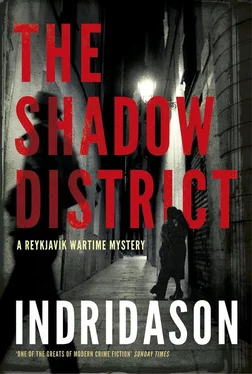She suspected that the old woman had her reasons for not wanting to discuss it. On the rare occasions when Petra had asked her about Rósamunda’s death, if she was reading about a murder in the papers for instance, she had sensed her mother’s reluctance to dredge it up. But it had never entered Petra’s head that her mother might be sitting on information that could shed new light on the case.
She looked at Konrád curiously. She had conscientiously related everything she knew as accurately as possible, just as she had done previously for the old man, Stefán. They had both seemed so extraordinarily interested in her mother and Rósamunda, and she’d been eager to help.
‘Was it common for the women working for your mother to react like that? To refuse to take deliveries?’ asked Konrád.
‘I wouldn’t know.’
‘Your mother found it very unusual, didn’t she?’
‘Well, yes, she gave that impression. Though I think mainly because it was so rare for one of her staff to disobey her. Especially when it came to a simple task like that.’
‘And Rósamunda wouldn’t explain?’
‘No, but as I said Mother reckoned she’d had a nasty experience at that house the day she found her in tears.’
‘Do you know if Thorson — Stefán — was intending to act on this information?’
‘No, but he seemed very upset when I told him about it, though he didn’t explain why. As I said, I know very little about the case. He left shortly afterwards and I never heard from him again.’
‘Which house was it that Rósamunda refused to visit?’ asked Konrád. ‘Who lived there?’
‘My mother said she knew the woman very well and wasn’t aware that she had ever been rude to Rósamunda. Not that Mother ever raised the matter with her of course. She never told a soul, so the family in question wouldn’t have had a clue that there was a problem. The woman’s husband was a politician, an MP, according to my mother. That’s why she didn’t want to make a fuss.’
‘An MP?’
‘Yes, he died years ago. Mother said he was a person of considerable standing at the time and his wife sat on all kinds of committees, was involved in the Women’s Institute and so on. They were both Oddfellows, or whatever it’s called. She was pretty sure he was a Freemason too. Their son later became a cabinet minister.’
‘And Rósamunda refused to deliver a dress to the wife?’
‘Yes. Not just a dress but bedclothes as well. All terribly smart, according to Mother, with the couple’s monograms embroidered on the quilt and pillowcases — she remembered it vividly. Mother was always very proud of the quality of her seamstresses’ work.’
‘And when you told this to Stefán, he was startled?’
‘To be honest he seemed stunned,’ said Petra. ‘He kept asking me questions, like you’re doing now, kept repeating the same questions over and over again, as if he wanted to be sure he’d understood correctly.’
‘But you don’t know what action, if any, he intended to take?’
‘No. I haven’t the foggiest.’
‘And you didn’t hear from him again?’
‘No.’
‘But you gave him the names of the family involved?’
‘Yes, I did.’
‘Was he going to look them up?’
‘I don’t know.’ Petra paused, then added: ‘I got the feeling...’
‘Yes?’
‘I got the feeling he wasn’t satisfied with how the case was handled at the time. He wouldn’t have come round otherwise.’
‘Can you be more specific?’
‘I think that was why he came to see me. I sensed that he felt the case wasn’t closed. That he was unhappy about how he’d left it. Even before I told him about Rósamunda I could tell something was still nagging at him after all these years. It was like he was searching for reassurance that he’d done the right thing.’
‘Did he actually come out and say that?’ asked Konrád.
‘No, and I didn’t ask him,’ replied Petra. ‘It was just a hunch. But I could have been mistaken.’
‘As if he had a bad conscience about some aspect of the case?’
‘That was my instinct. That he wasn’t happy about it, and was even less happy after what I told him. When he left he was muttering something about a student.’
‘Oh?’
‘I didn’t quite catch it, but I heard him say “the student”.’
‘The student?’
‘Yes.
‘What student?’
‘I don’t know. I’ve no idea what was troubling him but the poor man seemed genuinely distressed.’
Jónatan offered no resistance when they led him through the doors of the prison on Skólavördustígur. On the way there he had protested against his detention, saying he needed to go home. There was so much to do and he had lectures first thing in the morning. Eager though he was to help the police, he didn’t have the time right now. He was polite, never descending into rudeness, but imploring, as if they’d be doing him a great favour if they let him go. Flóvent told him it was probably too late to continue the interview that night but they would resume their chat in the morning. Until then he would have to stay in the police cells.
‘But I’ve got lectures in the morning,’ pleaded Jónatan.
‘Perhaps you’d better take tomorrow off,’ said Flóvent.
‘But I haven’t got time to take a day off.’
The prison guards signed him in and escorted him to a cell, Flóvent following just behind. Jónatan kept up a constant stream of protests. When Flóvent asked if there was anyone he wanted to inform of his circumstances, Jónatan merely shook his head as if he still couldn’t fully grasp that they were going to lock him up.
‘I don’t want anyone to know,’ he said. ‘This is ridiculous. Surely you’ll have to let me go in the morning?’
He grabbed Flóvent’s arm as the door to the cell opened. ‘Don’t shut me in there, I beg you.’
‘We’ll have another chat tomorrow morning, son,’ said Flóvent. ‘It’s late. I’m afraid we have to do it this way. It can’t be helped.’
‘But I can’t bear it,’ said Jónatan, in a choked voice. ‘There’s been some terrible mistake. I don’t understand why you’re treating me like this. I didn’t... I haven’t done anything.’
‘Then we’ll straighten it all out tomorrow,’ said Flóvent reassuringly. ‘Don’t worry. If you’ve done nothing wrong, you’ll soon be able to go home again. You have nothing to be afraid of — if that’s the case.’
‘Don’t do this to me. Please, I beg you.’
The door closed on Jónatan.
‘Don’t shut me in here!’ He raised his voice for the first time and it carried through the cell door. Flóvent lingered outside for a moment or two, then headed back down the corridor, the sound of sobbing echoing behind him.
He and Thorson had felt they had no alternative but to detain Jónatan. The evidence was stacking up against him. He had known Hrund and had dealings with her when he was labouring on the roads up north. He was an enthusiast, practically an expert, in Icelandic folklore. Frank Ruddy had thought it possible he was the man he’d spied standing on the corner of Skuggasund the evening Rósamunda’s body was found. Jónatan smoked Lucky Strikes, just like the cigarette butts they had found in the street. Admittedly they were very popular, but all things considered it was another mark against Jónatan that he smoked them.
‘I guess Frank’s not the most reliable witness in the world,’ commented Thorson as they re-emerged onto Skólavördustígur.
‘Have you let him go?’
‘I told him he could rejoin his regiment. There’s no reason to hold him any longer. At any rate, he doesn’t seem to have attacked Rósamunda. We’ve found nothing to support that theory. And there’s been no news yet from the States about a criminal record.’
Читать дальше












